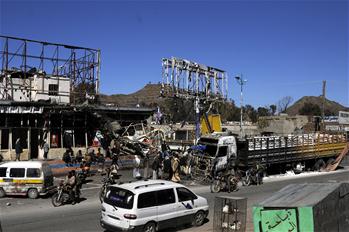BEIJING, Nov. 16 (Xinhua) -- Business aviation in China is "moving beyond infancy" as the greater aviation market continues to flourish, said the president of the U.S. National Business Aviation Association (NBAA).
"The business aviation industry in China has been evolving in positive ways, despite a slowdown in its growth rate," Ed Bolen said in an exclusive interview with Xinhua.
China's business aviation fleet numbered about 300 last year. While this was up about 5 percent year on year, growth was much slower than the consecutive year-on-year double-digit expansion before 2014.
The fleet of business aviation aircraft, or corporate aircraft, were estimated to 18,000 in the United States.
Bolen said the numbers don't represent the whole picture, but they are good indicators of the industry and market. The business aviation sector in China has been constantly growing, with the fleet expanding and flight hours increasing.
"Starting from zero, it is a quite young and new industry in China. Alongside the fleet base increase, it's natural to see a declining annual increase rate over the years," he said.
Business aviation began in China in the mid-1990s when the country's first business aviation charter service was launched by Deer Jet, an arm of Hainan Airlines Group.
In 2004, China's first private aircraft was purchased by an entrepreneur in the chemical fiber business.
Around 2010, the industry started to take off as Chinese executives realized how charter flights could save time getting around the vast country and expanding abroad like their foreign peers.X "Global aviation insiders were astonished at the year-on-year two-digit increases in China's business aviation fleet. China was on my global travel list," said Bolen.
However, business aviation has also raised popular ire in some quarters with users accused of flaunting their wealth or entertaining government officials with "hidden bribery".
Bolen noticed how the nouveau-rich once preferred to show off in new long-range, wide-body aircraft.
"However, positive changes have been seen since the sector was affected by the global economic slowdown and the Chinese government's anti-corruption campaign," said Bolen.
"China's business aviation is evolving in multiple positive ways, in both the customer and government sides."
He said that China's business aviation fleet is multi-dimensional with various types of aircraft suited for different purposes. Customers are more rational and practical in selecting private and charter aircraft.
"In some remote areas in China's massive western regions, more and more small turboprop planes are shuttling around cities, mines or engineering facilities with the management or technical team aboard. Chinese companies are running their businesses like their foreign peers, with airplanes as efficient tools," said Bolen.
Some Chinese entrepreneurs are considering more cost-effective second-hand aircraft, while some require in-flight WiFi to make the aircraft an office or meeting room in the air.
"We are encouraged to see the Chinese authorities have realized the importance of general aviation, with business aviation as a crucial part," said Bolen.
"They are opening up low-altitude airspace, have more efficient flight approval procedures, more airports to take off and land at, and more rules and safeguards so the industry can grow," he added. ' Like most industry insiders, he is confident in the future of China's business aviation, despite it being particularly sensitive to the nation's economic vitality and policy environment.
"Business aviation is a good industry. Like a 'time machine', business aircraft speed progress for Chinese business people and bring the nation closer to the world," Bolen said. Enditem










